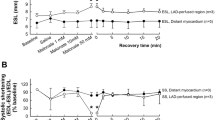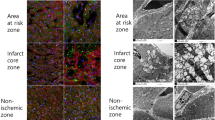Abstract
Recent studies have repoarted that prolonged infusion of N-2-mercaptopropionyl glycine (MPG), a diffusible antioxidant, could limit infarct size in dogs. However, there are no comparable studies testing this agent in other species. We examined the efficacy of MPG in a rabbit model of infarction. Rabbit hearts were subjected to a 30-min coronary artery occlusion. Infarct size expressed as a percentage of risk zone was determined by either triphenyltetrazolium chloride (TTC) staining after 3 h of reperfusion (study 1) or by histology after 72 h of reperfusion (study 2). In study 1, 37 ± 2.6 % of the risk zone infarcted in the control group. Intravenous MPG at a rate of 100 mg/kg/h starting 15 min after the onset of ischemia and continuing until 1 h after reperfusion had no effect on infarct size (35.4 ± 3.4 % infarction). However, infusion of MPG until the end of reperfusion significantly reduced infarct size as measured with TTC to 17.2 ± 2.5 % (p < 0.01 vs. control group). In study 2, 48.6 ± 4.0 % of the risk zone infarcted in the control group. In the treatment group MPG was started as above and was continued for 4 h of reperfusion followed by an intramuscular injection at the termination of the intravenous infusion. No protection was seen after 72 h of reperfusion (43.8 ± 2.1 % infarction). These findings reveal that MPG at a dose and schedule that appeared to protect the dog heart could not effect sustained protection in the rabbit heart. TTC staining revealed that MPG appeared to have preserved viability for up to 3 h of reperfusion suggesting that failure may have been due to early withdrawal of the drug. Alternatively, early TTC staining may yield spurious results under conditions in which protection is dependent upon antioxidant or free radical scavenger treatment as has previously been suggested. It is concluded that MPG as administered in the previous canine studies does not limit infarct size in all species, thus raising a concern about MPG's potential efficacy in man.
Similar content being viewed by others
Author information
Authors and Affiliations
Additional information
Received: 6 July 1998, Returned for revision: 29 July 1998, Revision received: 8 December 1998, Accepted: 9 December 1998
Rights and permissions
About this article
Cite this article
Miki, T., Cohen, M. & Downey, J. Failure of N-2-mercaptopropionyl glycine to reduce myocardial infarction after 3 days of reperfusion in rabbits. Basic Res Cardiol 94, 180–187 (1999). https://doi.org/10.1007/s003950050141
Issue Date:
DOI: https://doi.org/10.1007/s003950050141




